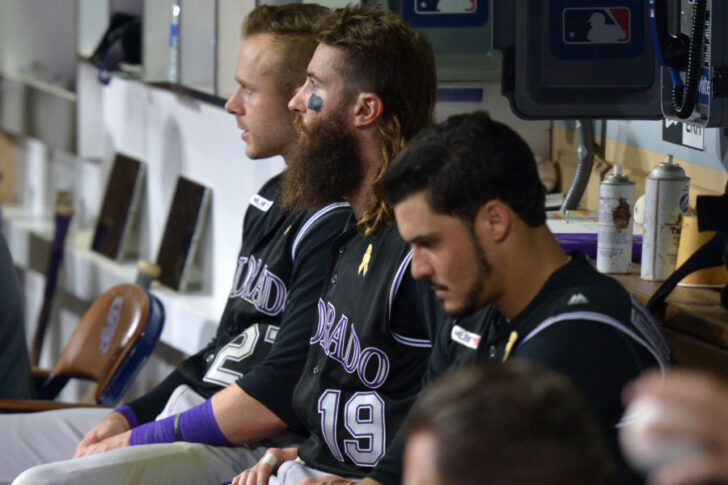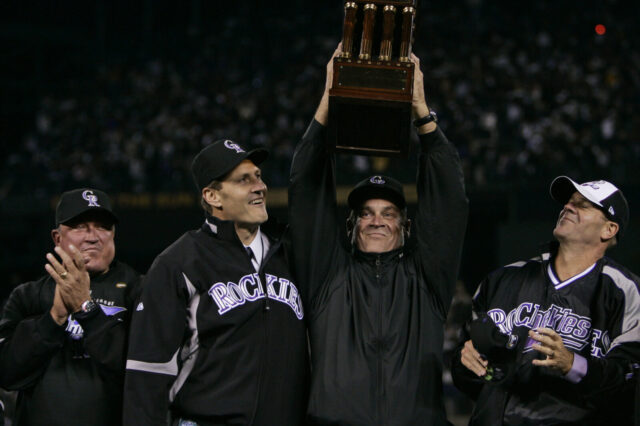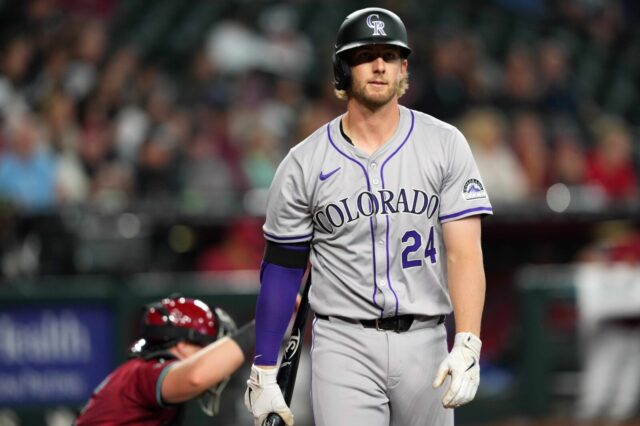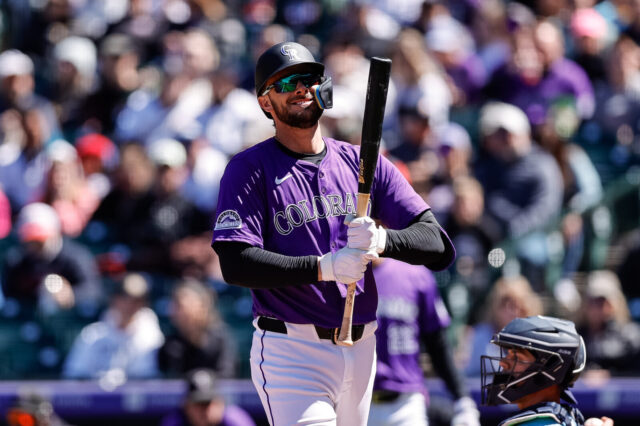“It feels like a rebuild.”
Those words set the tone for the immediate future surrounding the Colorado Rockies baseball club.
Nolan Arenado, the team’s captain and face of the franchise, uttered those words in the midst of what was the single most disappointing season in club history.
The 2019 season was littered with expectations for the Rockies who were fresh off back-to-back appearances in the postseason. The 2017 and 2018 seasons were magical for Colorado. There appeared to be a plan in place to transition the team from a fringe playoff club to a serious World Series contender.
But instead of being greeted with the sweet taste of victory and progression, Rockies’ fans who were drinking the kool-aid ahead of the 2019 season instead found bitterness as they watched their club plummet to the depths of the National League.
Colorado finished a whopping 20 games under .500 with a dismal record of 71-91. Colorado was just one win better than the San Diego Padres who are on the fast track to becoming one of the best young teams in the game. Additionally, the Rockies sat back and watched as the aging San Francisco Giants best them by six games despite their season being a farewell tour for longtime skipper Bruce Bochy.
There is no denying the 2019 season was a frustrating go-around for the Rockies, but is there hope for the future? Any excitement for the upcoming seasons was doused by General Manager Jeff Bridich and owner Dick Monfort who addressed members of the media this week after the season ended.
As it stands, it appears as if the Rockies will have a very similar roster complexion in 2020. Nolan Arenado, Trevor Story, Charlie Blackmon and David Dahl provide the Rockies with one of the best offensive nuclei in the game. That said, beyond those four core players, the Rockies are relatively thin around the diamond.
Ryan McMahon had a nice year and some of the other young players, such as Raimel Tapia, were productive in spurts. But that was it. Outside of the Rockies’ heavy hitters, their lineup is pretty weak and nowhere near the caliber it needs to be should Colorado want to contend for a World Series.
There’s nothing new to say about the pitching staff. Kyle Freeland was egregious. German Marquez was spotty. Jon Gray was solid, but had his season cut short due to an injury.
It’s still mind-blowing how the Rockies entered the year expecting to make it past the NLDS with Tyler Anderson and Chad Bettis at the back end of their rotation. No disrespect to Anderson and Bettis, but under no circumstances should they be a part of a championship rotation.
And do we even dare talk about the bullpen?
Both the Rockies pitching staff and lineup require an upgrade but don’t expect the Monforts to open up the piggy bank this offseason.
“I don’t think we have a lot of flexibility next year of making some great big splash,” Monfort said Tuesday. “That doesn’t mean we can’t get creative and do some things that will help if the right deal comes along.”
The Rockies had made the postseason two years in a row. The team is consistently ranked near the top of the MLB for attendance. The organization just received a new TV deal. Each of those facts begs the question: How can the Rockies not continue to invest in their roster?
Sure, Story and Dahl are up for contract extensions in the future, but the name of the game is to win now. Conserving payroll will not accomplish that goal. Once again it appears as if the Rockies are playing to get lucky.
The Rockies’ impending TV deal has been the talk of the town the last few seasons amongst the fan base. Colorado’s current TV deal is widely regarded as one of the worst in the game. There was hope a new deal would bring in more cash flow, allowing the team to stretch their budget a bit.
It was bizarre when news broke earlier in the week that the Rockies and AT&T SportsNet came to an agreement on a new deal that will begin in 2021. What’s perplexing about this is there was not necessarily a rush for a deal to be done. Colorado will still operate under its current agreement in 2020, and the main TV issues in the city pertain to the Denver Nuggets and Colorado Avalanche.
Colorado pulled the trigger on this deal relatively early and gave off the vibe that they did not do much due diligence about other options. What’s most frustrating of all is the new deal won’t help the club financially for another two years. Therefore, when the deal does kick in, there’s a chance Colorado’s current group of players will no longer be in their prime or perhaps even on the roster at all.
“I’ve always said (that) revenues pass right through to the payroll, and I think we’ve proven that over time,” Monfort said. “It doesn’t start until 2021, so there’s no additional money next year. So I don’t think there’s going to be any huge splashes (in free agency). We’ve pretty much spent what we have through 2020. But it’s going to help the franchise (in the future). It’s going to help the franchise keep players.”
To put a cherry on top, the new deal is for a minimum of 150 games a season, meaning Rockies’ fans will likely still have to deal with a handful of blackout games throughout the year.
Despite everything that was discussed during the Rockies’ media availability, the most stunning tidbit of information came from Bridich in response to Arenado’s comments about a rebuild and his star player’s contract.
“If we were truly in a rebuild, Nolan Arenado probably wouldn’t be around here to make comments like that, right?” Bridich said. “If you look at rebuilds across the league, some teams have done it very well. If you look at our actions over the last how many years you want to include — four, five or six — we’ve never come out and said, ‘Hey, we’re rebuilding.’ It doesn’t seem like based on the commitments that we’ve made … those are not the earmarks of a rebuild.”
Bridich is correct in one facet. The Rockies’ actions over the last few seasons have not indicated that team is in a rebuild. However, the lack of production from those actions have the Rockies stuck in limbo.
Colorado entered the season with an Opening Day payroll of $156 million, the largest mark in club history. The Rockies already have $120 million committed to the team for 2020 which will be near the league average.
Given the amount of money the Rockies have tied up to Arenado, Blackmon and veterans like Ian Desmond and Daniel Murphy, Bridich’s hands appear to be tied given ownerships reluctance to continue to invest in the club.
The Monforts allowed Bridich to stretch the budget the last few seasons with signings such as Desmond (5yr, $70M), Murphy (2yr, $24M) Wade Davis (3yr, $52M), Bryan Shaw (3yr, $27M), Jake McGee (3yr, $27M) and Mike Dunn (3yr, $19M).
Virtually every deal has backfired on Bridich. But rather than re-investing in the team, the Rockies are planning to roll the dice on their prior investments despite their lackluster results.
“We are always looking, but it doesn’t mean we can always do things in terms of bringing players in,” Bridich said. “We have in the past three or four yours — I have. Some of it has worked, some of it hasn’t worked. But we’re always looking. That being said, I think there is still a foundation as long as certain guys bounce back.”
The Rockies are banking on their current crop of players to figure things out entering 2020, a notion that seems more like a pipe dream than a realistic idea.
All eyes will be on Arenado entering next summer. The All-Star shocked the baseball world when he opted to forgo free agency to resign with the Rockies last offseason. Colorado inked Arenado to one of the most player-friendly deals in baseball, an eight-year, $260 million contract with an opt-out after the third season.
The three-year opt-out is viewed as a window for Arenado to decided if the Rockies can legitimately contend for a title. Once the deal was made public, intrigue set in regarding the three-year opt-out and what it could mean for Arenado and the Rockies.
Arenado and his agent were commended for striking such a great deal, but what’s strange is the Rockies, specifically Bridich, are the ones who pushed for the opt-out.
Rox GM Jeff Bridich said he is the one who pushed for a player opt-out in Nolan Arenado's $260 million contract, that Arenado didn't ask for it. And Bridich said he feels no pressure to prove a winning team as a way to keep Arenado.
— Nick Groke (@nickgroke) October 1, 2019
The reasoning for the opt-out included that the Rockies did not want to get stuck with a monster deal on the books as they did in the past with players like Troy Tulowitzki and Mike Hampton.
The reasoning is justifiable, but if the Rockies genuinely believe they can contend for a championship with Arenado on their team, shouldn’t they have just gone all in?
It’s understandable why Arenado would want the opt-out, but not so much for the Rockies. Arenado is the best third baseman in the game and is on the fast track to becoming the greatest player in club history. Why did the Rockies provide him the opportunity to walk out?
The only logical explanation is Colorado is playing to get lucky, just like they have since the franchise’s inception in 1993. The Rockies have never gone all-in on winning. They’ve made calculated decisions to try and compete, but history says the team is content with mediocrity, especially after previous investments fail to pay off.
Coors Field is beautiful. It’s Denver’s hottest summer attraction and the best bar in LoDo. The Rockies will always draw fans regardless of the product on the field, and because of that, effective change is not on the horizon despite the club’s recent success.
“When some teams don’t play good over a long period of time, they choose to do a (rebuild), but our goal is to play better and to win,” Monfort said. “I also hear — what is the phrase? ‘You have a window of time’ — I think we have a huge window of time.”
While the Rockies goal is to “play better and to win” it’s hard to envision the team returning to the playoffs without some significant upgrades to the roster. The 2019 season was dreadful and a far cry from the previous two seasons. That said, after showing a glimpse of hope, the Rockies are primed to return to the middle of the pack in the National League.
Monfort said, “I think we have a huge window of time,” and he’s right. Colorado does have a great core, that if paired with the proper talent, could be exquisite in 2020 and beyond; however, the franchise has not shown the motivation to bolster the club to that of a title contender.
On the horizon of a new decade, the Rockies are primed for another run of mediocrity, shadowed by the friendly and lovable confines of Coors Field that will continue to mask the club’s deficiencies around town.



